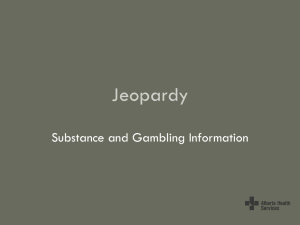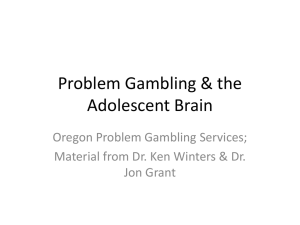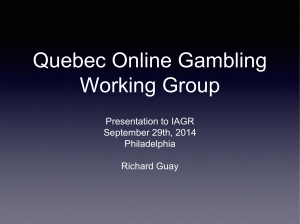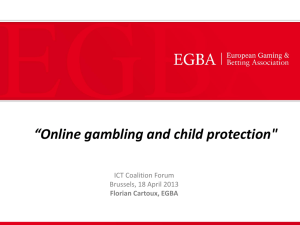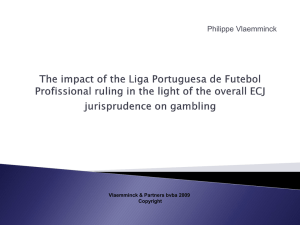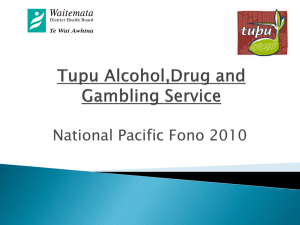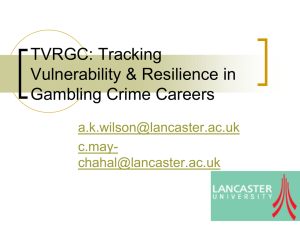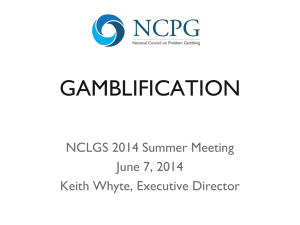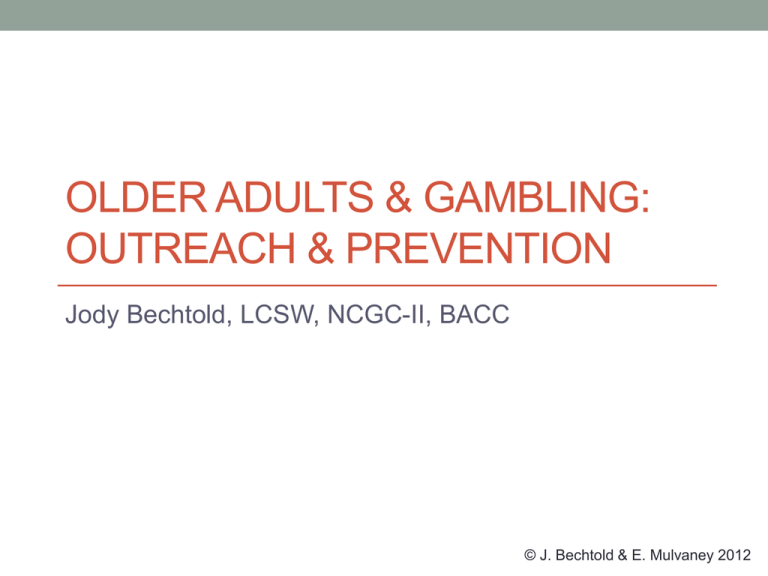
OLDER ADULTS & GAMBLING:
OUTREACH & PREVENTION
Jody Bechtold, LCSW, NCGC-II, BACC
© J. Bechtold & E. Mulvaney 2012
WHY FOCUS ON
OLDER ADULTS?
© J. Bechtold & E. Mulvaney 2012
Changing Demographics:
More Elderly
Number of Persons 65+, 1900-2030
Source: A Profile of Older Americans: 2003, Administration on Aging, HHS
number in millions
80
71.5
70
54.6
60
50
40
25.7
30
20
3.1 4.9
10
9
31.2 35
40.2
16.7
0
1900
1920
1940
1960
1980
1990
2000
2010
2020
2030
Year (as of July 1)
© J. Bechtold & E. Mulvaney 2012
What is a Baby Boomer?
• Those born between (and including) 1946 and 1964
• Currently represent 29% of the U.S. population
© J. Bechtold & E. Mulvaney 2012
LEISURE ACTIVITIES &
SOCIALIZING
© J. Bechtold & E. Mulvaney 2012
Average Daily Time Use by Adults Ages 65 to 74 Years
Purchasing
goods and
services
4%
Bureau of Labor Statistics, 2006 Time Use Survey
Grooming
2%
Other activities
5%
Eating and
Caring for and drinking
6%
helping others
2%
Sleeping
37%
Household
activities
11%
Work and workrelated activities
4%
Leisure activities
29%
© J. Bechtold & E. Mulvaney 2012
Daily Leisure Activities for Older Adults
Bureau of Labor Statistics, 2006 Time Use Survey
29%
8
0.8
7
0.8
1.1
6
0.8
0.9
0.2
0.7
5
Hours
Per 4
Day
0.6
0.5
0.3
Relaxing & thinking
Participation in sports,
exercise, & recreation
0.4
0.2
3.8
3
Other leisure activities
(including related
travel)
Reading
4.2
2.9
Watching TV
2
1
0.7
0.8
0.8
Socializing &
communicating
0
Ages 55-64
Ages 65-74
Ages 75+
© J. Bechtold & E. Mulvaney 2012
Ten Keys to Healthy Aging
1.
2.
3.
4.
5.
6.
7.
8.
9.
10.
Lower LDLs
Combat Depression
Prevent Bone Loss & Muscle
Weakness
Control Systolic Blood
Pressure
Be Active
Regulate Diabetes Blood
Glucose
Stop Smoking
Maintain Social Contact
Participate in Cancer
Screening
Get Regular Immunizations
From: Center for Healthy Aging at www.healthyaging.pitt.edu
© J. Bechtold & E. Mulvaney 2012
Potential Benefits of Leisure Activities for
Older Adults
Leisure activities promote
• Continued socialization
• Physical health
• Management of chronic conditions
• Emotional health
• Cognitive health
© J. Bechtold & E. Mulvaney 2012
Gambling as Leisure
• Provides an opportunity to socialize with others outside
the home
• Potentially provides a way to use cognitive skills and
maintain cognitive skills
• May promote some physical activity (depending upon
amount of walking or other movement used to reach site)
© J. Bechtold & E. Mulvaney 2012
MA Council (Spring 2009 News)
• Gambling was identified as the most frequent activity by
older adults
• Bingo was most popular
• Casinos were second most popular
© J. Bechtold & E. Mulvaney 2012
Socialization of Gambling
• Gambling is a socially acceptable form of entertainment
• We live in an actively gambling society
• Fundraisers
• PA Lottery slogan -- “benefits older Pennsylvanians”
• Gaming venues are upscale, accommodating, and have
something for everyone
© J. Bechtold & E. Mulvaney 2012
New Jersey Senior Gambling Study
• 3 out of 4 seniors are gamblers and one-quarter are non-
gamblers
• Nearly 2 out of 3 seniors play the lottery and almost as
many gamble at casinos
• Almost 7 out of 10 casino-going gamblers spend most of
their time playing slot machines
• Vast majority began gambling before they were 55 years
old (86%)
Council on Compulsive Gambling of New Jersey 2006
© J. Bechtold & E. Mulvaney 2012
McNeily & Burke, University of Nebraska
Medical Center, 2000
• Motivation for Gambling in Older Adults
• Boredom
• Relaxation
• Getting away
• Need for Social Interaction
• Gambling most frequent activity
• Bingo being most popular within the communities
© J. Bechtold & E. Mulvaney 2012
McNeily & Burke, University of Nebraska
Medical Center, 2000
• Older Adults sampled in casinos were:
• More likely to access different types of gambling
• Spend more on gambling each time they gambled
• Spend more money then intended
• Utilized credit and/or borrowed money to gamble
• Felt guilty about gambling
© J. Bechtold & E. Mulvaney 2012
Marketing Efforts to Seniors by
Casinos
• Targeted offers to senior centers, retirement communities
•
•
•
•
•
and senior groups
Free or reduced cost buses
Discounted food
Free or discounted entertainment
Other promotional coupons
Prescription medication coupons
© J. Bechtold & E. Mulvaney 2012
Remember…
Temptation is in the marketing…
© J. Bechtold & E. Mulvaney 2012
Older Adults & Gambling
• Reasons Older Adults Gamble:
• Disposable income
• Opportunity and Availability
• Boredom; Time on hands after retirement
• Loneliness and/or Depression
• Loss of spouse/friends/family
• Adjustment to new location
• Limited Recreational Alternatives
• Physical limitations, social limitations
© J. Bechtold & E. Mulvaney 2012
Older Adults & Gambling
• Reasons Older Adults Gamble:
• Relieves physical pain
• Supplement income
• Same reasons as younger gamblers
What?
• Social
• Fun
• Parkinson’s Disease / Restless Leg Syndrome
© J. Bechtold & E. Mulvaney 2012
Parkinson’s Disease
Researchers found that dopamine agonists, a common drug used to
treat Parkinson’s Disease and Restless Leg Syndrome, may have a rare
side effect of excessive gambling.
1,884 patients screened during a one-year period.
9 patients were classified as pathological gamblers
Of those 9 classified as PG, the gambling behavior was severe enough
to cause financial problems in excess of $60,000.
None of the patients reported previous gambling issues.
1 patient withdrew from the project, declined therapy, and later
committed suicide.
American Academy of Neurology, 2003
© J. Bechtold & E. Mulvaney 2012
Parkinson’s Disease
Researchers from the Mayo Clinic in Minnesota measured
the effects of dopamine agonists on patients with
Parkinson’s Disease.
267 patients screened during a two-year period.
38 patients given dopamine agonists in therapeutic
doses.
7 out of 38 patients showed signs of excessive gambling.
Mayo Clinic, 2009
© J. Bechtold & E. Mulvaney 2012
OUTREACH EFFORTS
Jody Bechtold & Beth Mulvaney
(PA Department of Health, Outreach Mini-grants
awarded 2009 & 2010)
© J. Bechtold & E. Mulvaney 2012
2 Outreach Models
Model 1:
Model 2:
Professionals in the Community
Peer Mentor in the Community
Goal: Reach 230 people
• Professionals presented at
community-based locations
(4 locations/events)
• Promotional materials –
“The Casinos are here –
how to make the most of
your leisure time”
• 2 hour events at non-event
times of current locations
• Served food and beverages
Goal: Reach 145 people
• Peer Mentor was primary
presenter at church and
residential locations (3
events)
• Primed the residential
location 4 weeks in advance
with promotional materials
• Scheduled just before “big”
regularly scheduled event
• Served food and beverage
© J. Bechtold & E. Mulvaney 2012
© J. Bechtold & E. Mulvaney 2012
© J. Bechtold & E. Mulvaney 2012
Results
• Only reached 76 older adults across 5 sites and 7
•
•
•
•
•
planned presentations
Use of the word “gambling” in Program Title – mixed
messages/perceptions
Perception of staff regarding the usefulness of this type of
outreach
Member of group as internal champion
Times offered for the program – key consideration
Use of a Peer Mentor – well received
© J. Bechtold & E. Mulvaney 2012
FOCUS GROUPS:
GAMBLING & OLDER
ADULTS
Hartford Partnership Program for Aging
Education, University of Pittsburgh, School of
Social Work
(6 MSW students – final project, 2011)
© J. Bechtold & E. Mulvaney 2012
© J. Bechtold & E. Mulvaney 2012
© J. Bechtold & E. Mulvaney 2012
© J. Bechtold & E. Mulvaney 2012
Area Agency on Aging
Gambling & Older Adults Workshop
Goal: train 125 people employed by a regional AAA in a 6
hour workshop with keynote speaker
• 120 attendees
• Knowledge and awareness pre-and post-test indicated
usefulness
• Director level by-in - important
• 2 years later – with Director support
• Lacking relevance to daily work tasks & responsibilities
• Transportation routes include the casino
© J. Bechtold & E. Mulvaney 2012
LESSONS LEARNED
Moving towards “Best Practices”
© J. Bechtold & E. Mulvaney 2012
Lessons Learned
• Finding a program title to accurately identify program and
entice attendance is a challenge.
• Stigma creates a barrier to attendance for many people;
approaching with idea that this information could help a
friend or family member may make it more acceptable to
attend.
• The supportiveness of the program staff and agency
support made a difference in how well the program was
perceived. More understanding/support resulted in better
attendance.
• Having an older adult group member serve as an inside
promoter/champion for presenters helped to improve
attendance.
© J. Bechtold & E. Mulvaney 2012
Moving Towards Best Practices
• Scheduling at times /places when older adults already meet increased
•
•
•
•
•
attendance.
Priming the environment by posting materials or leaving out
brochures and information in advance may impact attendance
positively.
Using a peer mentor seemed to be a more acceptable model than
using professionals to present.
At six sites, the target audience was socially connected. Only at the
residential site was there an opportunity to reach out to people who
might be socially isolated (risk factor for developing problem
gambling).
For staff training, having strong administrative backing, no charge for
the training, and access to continuing education (CE) credits
increased attendance.
For staff training, having more relevance to daily job will help keep
“problem gambling” in the forefront
© J. Bechtold & E. Mulvaney 2012
Reaching Older Adults DIRECTLY
Socially
Connected
Older Adults
Get Agency Support
(Administration and
Program staff)
Identify “insider promoter /
champion”
Prime the environment
Plan program at times and
locations with already
scheduled events
Provide food
OR
Socially
Isolated
Older Adults
Develop
Brochures
Bulletin board displays
Newsletter articles
PSAs geared to Older
Adults
Deliver them to:
MD offices
Senior Housing locations
Neighborhood associations
Media – newspapers, TV
and radio
At residential Settings:
Get Facility Support
(Administration and
Program staff)
Train program staff
Identify “insider promoter /
champion”
Prime the environment
Plan program at times and
locations with already
scheduled events
Provide food
*** This assumes your state or locality has trained counselors who understand the needs of older
adult gamblers.
© J. Bechtold & E. Mulvaney 2012
QUESTIONS
© J. Bechtold & E. Mulvaney 2012
THANK YOU
Jody Bechtold, LCSW, NCGC-II, BACC
jody@jodybechtold.com
© J. Bechtold & E. Mulvaney 2012


